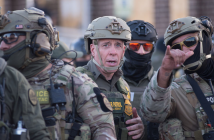– Drone Collision Tragedy in Orlando: A drone light show at Lake Eola Park during the holiday season resulted in a collision mid-air, causing drones to crash into a crowd and critically injure a seven-year-old boy.
– Safety and Security Concerns: The incident highlights the vulnerabilities of drone technology, raising questions about both public safety and national security, as drones can be hacked or weaponized for malicious purposes.
– Regulatory Gaps Exposed: Despite FAA regulations requiring safety measures and waivers for drone shows, the Orlando crash reveals that current protocols are insufficient to prevent accidents or attacks.
– Call for Comprehensive Counter-Drone Measures: Experts emphasize the need for a robust strategy to detect, disable, and defend against rogue drones, as well as stronger regulations and enforcement to prioritize safety.
– National Security Wake-Up Call: The incident underscores the growing risks posed by drones, urging policymakers, law enforcement, and the defense community to address the emerging threat proactively.
The holiday season in Orlando, Florida, was supposed to be a time of joy and celebration, but it turned into a nightmare when a drone light show ended in tragedy. Shocking footage captured the moment several drones collided mid-air and crashed into a crowd of spectators, leaving a seven-year-old boy critically injured and sparking urgent questions about the safety—and security—of drone technology.
The incident, which occurred during the third annual Holiday Drone Show at Lake Eola Park, serves as a stark reminder of the vulnerabilities we face in an era where drones are becoming increasingly ubiquitous. While these unmanned aerial vehicles (UAVs) are marketed as tools for entertainment, delivery, and even disaster response, their potential for harm is all too real. What happened in Orlando is not just a local tragedy; it’s a national security issue that demands immediate attention.
The facts of the case are harrowing. According to eyewitness accounts and video evidence, several drones malfunctioned during the show, colliding with each other before plummeting into the crowd. One of the drones struck seven-year-old Alexander Edgerton in the chest, causing severe injuries that required emergency open-heart surgery. His mother, Adriana Edgerton, described the horrifying scene, recalling how her son was left unconscious on the ground with blood streaming from his face. The image of a child lying injured after being hit by a drone is a chilling reminder of the dangers these devices pose when things go wrong.
What’s even more alarming is the broader context. While this incident appears to have been the result of a technical malfunction, it underscores a much larger concern: the lack of an effective defense against drones. The Federal Aviation Administration (FAA) regulates drone shows, requiring operators to obtain waivers and implement safety measures. However, as the Orlando incident demonstrates, these measures are not foolproof. And when drones are involved, the stakes are far higher than just a disrupted light show.
Consider the potential for malicious use. Drones can be hacked, weaponized, and deployed as tools of terror. A swarm of drones equipped with artificial intelligence could target large crowds, military installations, or critical infrastructure with devastating effect. The Orlando incident may have been an accident, but it’s not hard to imagine a scenario where similar technology is used as a weapon. The fact that we lack a robust defense against such threats is deeply troubling.
Danger from above – for national security as well as public safety
The FAA’s investigation into the Orlando drone crash is ongoing, but the agency’s response so far has been underwhelming. While the FAA reviews safety protocols and regulatory compliance, the reality is that current measures are insufficient. Geofencing and technical safeguards are important, but they are not enough to prevent accidents—or attacks. What we need is a comprehensive strategy to detect, disable, and defend against rogue drones.
This is not just a matter of public safety; it’s a matter of national security. As drones become cheaper, more accessible, and more sophisticated, the risks they pose will only grow. The Orlando incident should serve as a wake-up call for policymakers, law enforcement, and the defense community. We cannot afford to be caught unprepared in the face of this emerging threat.
The drone industry, for its part, has expressed regret and pledged to uphold safety standards. Sky Elements Drones, the company behind the Orlando show, issued a statement expressing hope for the injured boy’s recovery and commitment to working with the FAA and city officials to determine the cause of the incident. While such statements are reassuring, they do not address the deeper issue of how to prevent such tragedies from happening in the first place.
For the Edgerton family, the holiday season has been irrevocably altered. Their son’s recovery will be long and difficult, and the emotional toll of the incident will linger. But their story should not be forgotten. It is a stark reminder that the technology we embrace so enthusiastically can also pose grave dangers.
As a nation, we must take this incident seriously. The Orlando drone crash is not just a local news story; it’s a warning sign. We need to invest in research and development to create effective counter-drone technologies. We need to strengthen regulations and enforcement to ensure that drone operators prioritize safety. And we need to recognize that the threat posed by drones is not limited to accidents—it extends to the very real possibility of deliberate attacks.
The skies may be filled with drones, but we cannot allow them to become a source of fear and danger. The time to act is now. The lives of innocent people—like young Alexander Edgerton—depend on it.
Sources include:





Leave a Reply